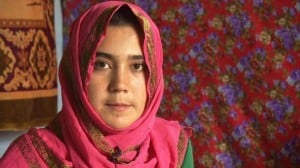Mali has adopted a new family law, which is actually a step back for the position of women in this predominantly Muslim country. According to this new law, women have to obey their husbands and men are head of the households.
After her retirement, Prof. Hasnath Mansur committed herself to the improvement of the lives of Muslim women in India. Poverty, not religion, is the reason that so many Muslim women have not had education, she claims.
Up to three-quarters of Kyrgyz brides are married as a result of what is called “bride kidnapping,” and in many cases, without the consent of the bride. The practice is now illegal, but hardly any case has made it to the court room.
In South Africa, some border officials have had some “incidents” with hijab wearing women recently. The women claim that they do not have any problem with taking the hijab off in order to be able to check the identity, but will only do so in a proper setting and that was something the officials did not provide.
While preparing for her morning prayers, an 89-year-old Tajik woman was attacked by a wolf in her own backyard. She lived to tell the story, but wolves are a big problem this time of the year in parts of the Central Asian country.
Spiegel features an article on the Turkish glossy Alâ with the title: “Vogue of the Veiled.” Always good to know that there are men out there who know exactly what women need in a magazine!
Fifteen Muslims in the USA won a conditional dismissal of charges after the amusement park disturbance that they caused, when the women were told that they could not go on some rides with their hijabs on.
Pakistani teenager “Mariam” won her case against her father, who sexually abused her over the course of several years. This is the first public incest case in the country, and her story has inspired a report on incest victims in the country.
The proposed ten percent Libyan election quota, which was reserved for women, has been dropped, according to a Western diplomat.
In Morocco, there Bassima Hakkaoui is now the only female Minister in the government. According to local activists, this is not surprising, and an indication about the direction this conservative government wants to go…
Pashtun singer Nazia announced during her January 21st concert in the UAE that she will quit singing, to live a life as a devoted Muslim woman. Fans are devastated; many Pashto artists quit their careers early. Or get killed.
Even though Islam states that women should share in the inheritance of their family members, in many cases in Kashmir, reality is that women inherit nothing, and are considered to be the poorest section of society.
When Sharah, an Afghan woman, went to the hospital to give birth to her baby, she found out that she was not carrying just one “bundle of joy,” but six. Shocking news, especially in Afghanistan, which is one of the worst countries to be a young child, with one in 10 children not reaching the age of five.
The Islamic Fiqh Council in Khartoum, Sudan has spoken: “No soccer for the Sudanese women!” Creating a female soccer team is apparently an “immoral act.”
Dr. Souad Al Oraimi, a sociology professor at the United Arab Emirates University, calls for more proactive Emirati women to realise social acceptance. In her opinion, local women’s associations should transform from service providers to women’s rights advocates.
Carnita Matthews, the Muslim woman from Sydney, Australia, whose case prompted laws that allow the police to ask people to uncover their face, has lost the bid for the state to pay her legal bill.
During a political meeting among tribal elders in Northern Pakistan, the only female member, a young woman called Dur-e-Shawar, talked about gender equality and women’s rights.
In her article Hania Sholkamy tries to answer the question why women are at the heart of Egypt’s trials and tribulations. Zainab Magdy argues that Egyptian women have always been in the margin, but during the revolt they have been in the centre, and now there is no way back.
Amani Musa Hilal, the daughter of the Janjaweed leader Hilal, and polygamous Chadian president Idriss Deby got married last weekend in Khartoum, Sudan. The Sudanese president was present and he was representing the bride during the ceremony. It is said that the dowry was $26 million, of which $25 million was paid to Amani’s father and his Janjaweed. Guess how many guns one could buy from that…
Manal al-Sharif, the woman activist known for her campaign to legalize women drivers in Saudi Arabia, was not killed in a car accident earlier this week, in contradiction to what was published on many newssites earlier this week.
Nigeria’s Daily Trust newspaper has presented Niger Republic jurist Fatimata Salifou Bazaye with the African of 2011 award for her “track record as an incorruptible judicial officer.”
A Muslim woman in hijab in Arkansas, USA, was asked toleave the court room or remove her “head gear.” In The Bahamas, a Muslim woman was not allowed to enter a bank, because she was wearing a khimar/long hijab and new security policies forbid any headgear and sunglasses.
In Malerkotla, Punjab, India, two Muslim women (and their partners) battle it out, publicly, for January 30 elections.
In South Tajikistan, at least 16 underage girls have been married off; in some cases parents have even forged the documents of the daughters to make them appear older.
A Muslim widow in Pattani, Thailand was killed while she was visiting the grave of her husband. She is one of many victims of the conflict in Southern Thailand.













